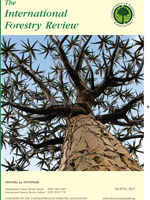Against a backdrop of growing concerns over REDD implications for tenure of forest-dependent communities, very few scientific studies have attempted to assess the linkages between the two. This paper offers empirical evidences for impacts of REDD intervention based on a case study of Thailand, where de jure state property and de facto tenure apparently co-exist. In contrast to the existing literature proposing positive tenure impacts, the findings suggest that REDD would not be sufficient to incentivize the government to embark on tenure reforms or any improvement of customary tenure and challenge REDD about its incentives for countries to accelerate tenure reforms. The findings also reveal that risks associated with tenure insecurity discouraged REDD investment leading to the withdrawal of the fund altogether. The findings enrich the on-going debates on the tenure impacts, tenure reform and competing agendas and provide insights to support the development of future national strategies and frameworks. The paper moreover proposes measures to create enabling conditions for REDD .
How to translate text using browser tools
1 December 2015
REDD and Tenure: A Case Study of Thailand
N. Tulyasuwan,
M. Henry,
A. Karsenty
ACCESS THE FULL ARTICLE

International Forestry Review
Vol. 17 • No. 4
December 2015
Vol. 17 • No. 4
December 2015
community forestry
payment for environmental services
Southeast Asia
tenure insecurity




